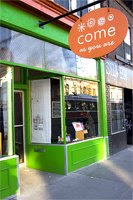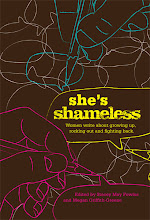 Genevieve Weigel was skipping class, riding the deserted subway back and forth between Kipling and Kennedy when three older male teens entered her car. One sat beside her. When he asked the 15-year-old for her phone number she didn’t feel threatened, but then he placed his hand on her thigh.
Genevieve Weigel was skipping class, riding the deserted subway back and forth between Kipling and Kennedy when three older male teens entered her car. One sat beside her. When he asked the 15-year-old for her phone number she didn’t feel threatened, but then he placed his hand on her thigh.Weigel shoved it off and rose to leave, standing taller than the trio. When the groper blocked her way and told her she wasn’t going anywhere she responded with the angry, gut wrenching yell she learned in Wen-Do. “Back off!” She struck him in the gut and he buckled to the floor.
Another guy wrapped his arms around her from behind. She instinctively shoved her body backwards, smashing him into the connecting subway door, and rammed her heel up into his groin. He collapsed. The third did nothing as she pressed the yellow emergency strip, the doors closing behind her as she walked out of the subway car, which had just arrived at a station. Shaken, she told the conductor what had occurred, and left.
Weigel, who served as this year’s events coordinator for Ryerson’s Women’s Centre, took her first Wen-Do Women’s Self Defence class when she was 12-years old.
What she experienced on public transit is the kind of success story that women share in Wen-Do.
Growing up she was usually stronger than the boys in her classes and often beat them in arm wrestling matches. When she was told that girls are weaker than boys she knew otherwise. “That always seemed like bullshit to me,” said Weigel.
Wen-Do exposed Weigel to her first feminist framework. “It was almost a revelation, like ‘Oh my God, I’m not by myself in this, and women are powerful and I knew somebody knew that,” she said loudly, her crimson lips parting in a broad smile.
Wen-Do originated in 1972 and is Canada’s longest running women’s self defence organization, as well as a registered charity. It was developed in Toronto by Ned and Ann Paige in response to the murder of Catherine Genovese in New York, who was stabbed and killed in 1964 within earshot of 38 neighbours, none of which called the police.
Wen-Do is endorsed by the Toronto Rape Crisis Centre and taught entirely by women, for women and girls (ages 10 and up) of all ages, sizes, physical and mental abilities. Physical and verbal techniques are interspersed with open discussion of violence against women and girls from an anti-oppressive, feminist perspective. Wen-Do emphasizes three goals: awareness, avoidance and action.
Deb Chard has been teaching Wen-Do full-time for 20 years, and taught Weigel’s first introductory course. She explains that self-defence means surviving and doesn’t always require punching or kicking.
 She leans forward, elbows resting on her knees, her pale blonde hair short and textured. “We’re looking at doing the least amount of self defence possible to run away,” she said, hands clasped, eyes fixed on each of us intently. “That’s what this is all about. I hope I never have to do this but these are some tools that I have in my tool box.”
She leans forward, elbows resting on her knees, her pale blonde hair short and textured. “We’re looking at doing the least amount of self defence possible to run away,” she said, hands clasped, eyes fixed on each of us intently. “That’s what this is all about. I hope I never have to do this but these are some tools that I have in my tool box.”After centuries of being told certain outfits and behaviour cause harassment and abuse women accept it as truth, said Chard. It’s common to hear, “But I was asking for it.” If you wear those revealing clothes, drink, or go out alone late at night and something happens it’s your fault. From childhood we are taught to modify our behaviour but in Wen-Do we discuss how skimpy skirts have nothing to do with it.
“Women have been raped in every imaginable article of clothing that you can think of,” said Chard. Clothing becomes the justification, diverting attention from where the real responsibility lies.
 Chard explains that when womanized men experience sexual assault in prison it indicates the reality of rape power dynamics over a group. Suggesting that low cut prison outfits instigate rape is ridiculous. If we can understand this about men, why can’t we understand it about women?
Chard explains that when womanized men experience sexual assault in prison it indicates the reality of rape power dynamics over a group. Suggesting that low cut prison outfits instigate rape is ridiculous. If we can understand this about men, why can’t we understand it about women?Our Wen-Do instructor Denise Handlarski is lying on her back as a woman in a loose, pink t-shirt is bent over the face, straddling her waist and clasping her wrists down against the carpeted floor. It’s April 5 and I’m taking a free 15-hour Wen-Do course at York University, organized by York’s Sexual Assault Survivors’ Support Line (SASSL). Eleven of us are seated in a circle on the floor of a brightly lit room in the student centre, watching Handlarski demonstrate a defence manoeuvre for a pinned scenario.
Anne Rajesparam, an officer and training coordinator for SASSL, stands bent over facing the woman in the pink, arms hooked under her armpits in preparation to support her. When each woman confirms they are ready Handlarski pulls her heels against her butt and digs them into the floor while quickly snapping up her hips.
She simultaneously slides her arms down to her sides, resembling a snow angel motion as her “attacker” is launched forward over her head and into Rajesparam’s arms, emitting a loud gasp. Realistically, if an attacker pinned you while in bed the “bump” might send them headfirst into the headboard or the wall.
Over the course of the weekend we alternate between practicing physical techniques, verbal tactics and group discussions with breaks in between. In pairs we repeat hits into cushions, focussing on tightening our hands, breathing and yelling. We learn a variety of strikes, kicks and blocks in addition to wrist and choke releases, defence against weapons, and group attack strategies.
 Handlarski’s dark, defined curls hang at the nape of her neck and she wears thin black glasses when she isn’t demonstrating attack defences. She instructs us to inhale and exhale while executing defensive attacks, saying “hut.” The “h” breath opens up the diaphragm ending with a “t” sound that prevents us from biting our tongues.
Handlarski’s dark, defined curls hang at the nape of her neck and she wears thin black glasses when she isn’t demonstrating attack defences. She instructs us to inhale and exhale while executing defensive attacks, saying “hut.” The “h” breath opens up the diaphragm ending with a “t” sound that prevents us from biting our tongues.Yelling during a strike enables adrenaline and oxygen to fuse in the bloodstream, preventing us from freezing when afraid. It also provides a rush of energy and can surprise the attacker.
Handlarski reiterates that we’re not using strength against strength but using our larger body parts against the attacker’s weaker, smaller targets, such as a heel palm strike to the nose, a low kick to the shin, or a hammer fist to the collar bone.
These attacks are all examples of soft Wen-Do, which are not likely to cause permanent damage to most healthy individuals. Hard Wen-Do is a technique that could be fatal or cause permanent damage, such as knuckle jab to the windpipe or a strike to the temple.
Learning the differences between soft and hard Wen-Do is important in the context of the Canadian legal system, according to Sue Kernoham, a detective and coordinator at Toronto’s Sexual Assault Crimes Unit. Although every woman has the right to fight back, they have to work within the law and use reasonable force, says Kernoham.
If an attacker punches you and you retaliate by stabbing them that is excessive force. “It’s a really grey area, and all situations are unique. You need to be able to articulate why you used as much force as you did (in court),” she said.
 Handlarski gestures to the white calligraphy on her black tank top representing the Wen-Do symbol. In the centre is the Japanese character for “woman” surrounded by a circle, which she calls the line of justice. Women need to trust their instincts and give themselves permission to act, which can also mean escaping a dangerous situation. “I want you to believe you’re worth defending,” Handlarski said, looking around the circle at us.
Handlarski gestures to the white calligraphy on her black tank top representing the Wen-Do symbol. In the centre is the Japanese character for “woman” surrounded by a circle, which she calls the line of justice. Women need to trust their instincts and give themselves permission to act, which can also mean escaping a dangerous situation. “I want you to believe you’re worth defending,” Handlarski said, looking around the circle at us.
Weigel thinks it could be realistic for the Women’s Centre to ensure that a full, 15-hour Wen-Do course is available to women at Ryerson. She hopes to volunteer with next year’s coordinators and gain support from the Office of Discrimination and Harassment Prevention Services and the Ryerson Students’ Union (RSU) to subsidize expenses.
 Handlarski gestures to the white calligraphy on her black tank top representing the Wen-Do symbol. In the centre is the Japanese character for “woman” surrounded by a circle, which she calls the line of justice. Women need to trust their instincts and give themselves permission to act, which can also mean escaping a dangerous situation. “I want you to believe you’re worth defending,” Handlarski said, looking around the circle at us.
Handlarski gestures to the white calligraphy on her black tank top representing the Wen-Do symbol. In the centre is the Japanese character for “woman” surrounded by a circle, which she calls the line of justice. Women need to trust their instincts and give themselves permission to act, which can also mean escaping a dangerous situation. “I want you to believe you’re worth defending,” Handlarski said, looking around the circle at us.Weigel thinks it could be realistic for the Women’s Centre to ensure that a full, 15-hour Wen-Do course is available to women at Ryerson. She hopes to volunteer with next year’s coordinators and gain support from the Office of Discrimination and Harassment Prevention Services and the Ryerson Students’ Union (RSU) to subsidize expenses.
Full Wen-Do workshops regularly cost $100 a person, which the Women’s Centres’ budget can’t currently cover.
Toby Whitfield, the RSU vice-president of finances and services says that if the Women’s Centre requires additional funding for a student event, the Board of Directors will decide whether or not to incorporate it into next year’s budget. “If the priority for the Women’s Centre is to do something like this we would work to see if we could make that happen,” said Whitfield.
Another option for women on campus is Rape Aggression Defence for Women, a free, four-day course taught by Ryerson’s Security and Emergency Services Team. R.A.D. classes run once a semester but additional classes can be requested, says instructor Tanya Fermin-Poppleton.
Workshops focus on avoidance of threats in daily surroundings, like walking to and from the subway. Up to 12 women can attend R.A.D. and upcoming sessions are posted on the Security Services website as well as security bulletins around campus.
Having experienced sexual violence, Weigel wants to use Wen-Do as a way of regaining her voice and hopes to become an instructor someday. She feels that Wen-Do empowers women by discussing and experiencing what we can do as opposed to what we can’t.
“It really deals with how women are powerful, not just that they are oppressed and victims. Most of the time we resist and most of the time we’re successful and I think that needs to be something that women are taught.”
*Published in the May edition of The Ryerson Free Press

























No comments:
Post a Comment